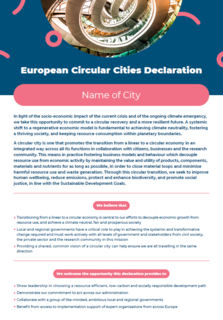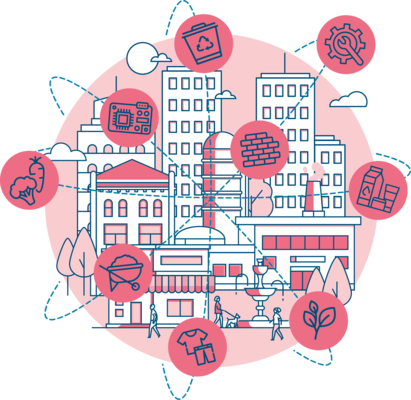The European Circular Cities Declaration
The European Circular Cities Declaration is designed to help accelerate the transition from a linear to a circular economy in Europe, and thereby create a resource-efficient, low-carbon and socially responsible society.
It aims to:
- Allow local and regional governments across Europe to communicate their commitment to supporting the circular transition
- Provide a shared vision of what a “circular city” is
- Underline the critical role which local and regional governments need to play in making this transition happen
- Establish a community of committed organisations to share their experiences, challenges and successes
The Declaration has been developed by a broad partnership of stakeholders to ensure that the vision and commitments contained are ambitious, yet achievable, and reflect the needs of all.
Founding signatories
Tirana (Albania); Ghent, Leuven and Mechelen (Belgium); Prague (Czechia); Copenhagen, Høje-Taastrup and Roskilde (Denmark); Helsinki, Lappeenranta, Oulu, Tampere and Turku (Finland); Grenoble (France); Freiburg im Breisgau (Germany); Budapest (Hungary); Florence and Prato (Italy); Wiltz (Luxembourg); Guimarães (Portugal); Bergen and Oslo (Norway); Ljubljana and Maribor (Slovenia); Seville (Spain), and Eskilstuna, Malmö and Umeå (Sweden).
Join us!
Does your city or region wish to sign the Declaration?
Contact us here:
info@circularcitiesdeclaration.eu
Cities and the circular economy
The recent launch of the European Green Deal signals a major step forward in the European Union's efforts to achieve a just and inclusive circular transition. Such a transformation is both a challenge and an opportunity for Europe's urban areas.
While cities are major contributors to climate change, material consumption and waste generation, they are also cradles of innovation and socio-economic transformation.
Moreover, local and regional governments manage a number of key sectors, they can drive demand to circular products through their procurement budgets, and can support citizen behaviour change.
City and regional governments have a fundamental role to play in achieving the circular transition.
What is a Circular City?


